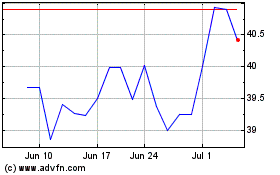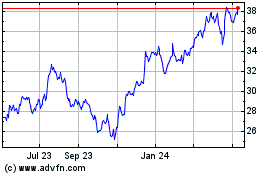By AnnaMaria Andriotis and Peter Rudegeair
Banks and financial-technology firms are starting to toughen
their approval standards for new loans to consumers and small
businesses. That means many people could find it hard to get credit
just when they most need it, as the novel coronavirus pandemic puts
thousands out of work.
Large U.S. lenders including JPMorgan Chase & Co., Bank of
America Corp., Capital One Financial Corp. and Santander Consumer
USA Holdings Inc. are among the companies reviewing and revising
certain lending criteria, according to people familiar with the
matter. Planned moves include approving fewer consumers with lower
credit scores, asking for more income documentation and placing
lower spending limits on new credit cards.
American Express Co. has scaled back financing offers to small
businesses, according to people familiar with the matter. Fintech
lenders Square Inc. and On Deck Capital Inc. said this week they
would do the same.
About half a dozen lenders that have found borrowers through
Fundera Inc., an online marketplace for small-business loans, have
paused new extensions of credit, said Fundera CEO Jared Hecht.
"Lenders have zero idea how to assess risk in this environment,"
Mr. Hecht said. "There is no model that can predict today if I lend
$1, will I get paid back?"
Lenders are concerned that rising unemployment and a potential
recession will send loan defaults soaring. The moves suggest at
best a pause and at worst an end to six-plus years of a bull run in
credit, where financial firms have been eager to lend and
underwriting standards for credit cards, auto loans and personal
loans have been relatively loose.
Lenders are scrutinizing applications for credit cards and
personal loans in particular because consumers often turn to them
when they are in a bind. They are usually unsecured, which means
lenders have little recourse if a borrower defaults, and they can
be the first loans people stop paying when money is tight.
Many lenders have said they would work with existing borrowers
who ask for help. Some lenders, for example, are increasing card
spending limits or delaying due dates on loans.
But lenders are reluctant to take on additional risk from new
customers.
"Even people who applied [for credit] in the last two weeks are
more vulnerable [now] than when they applied," said Brian Riley,
director of credit advisory services at Mercator Advisory
Group.
Loan solicitations by email have dropped for both credit cards
and personal loans, according to market-research firm Competiscan.
AmEx, Bank of America and JPMorgan have sent almost no card
solicitations in more than a week.
The changes could be most painful for low-wage workers such as
wait staff and hotel employees uncertain when their next paycheck
will arrive. Some lenders say they have noticed consumers applying
for credit at several financial institutions at around the same
time, a sign that consumers are reaching for credit lifelines while
they can still get them.
To make matters worse, many Americans were already overstretched
before the pandemic, tapping credit cards, auto loans and student
loans as costs soared over the past decade but incomes largely
failed to keep pace.
LendingClub Corp., an online lender that is one of the largest
providers of personal loans, said last week it would approve fewer
loans from first-time applicants, require more verification of
income and employment status and reduce approval rates to
"higher-risk borrower populations."
"Like many other businesses during this period, we are focused
on retaining our best customers," the company said in a regulatory
filing this month.
Small-business lenders also are getting stingier with credit. On
Deck recently stopped making new loans to movie theaters, hotels
and nightclubs. It also made other changes to "significantly
tighten underwriting standards," the company said in a regulatory
filing Monday.
Last week, On Deck informed LD3 Inc., an auto-transport business
in Berthoud, Colo., that its $35,000 line of credit with a 24.9%
annual percentage rate had been suspended, said co-owner Debbie
Coyle. LD3 had drawn on that line intermittently since 2017,
letting On Deck recoup what it was owed from LD3's checking account
every week, and had paid off all outstanding balances by early
February.
On Deck asked LD3 on March 20 to submit three months of bank
statements and a screenshot of its business transactions over the
previous few weeks if it wanted On Deck to consider reopening the
credit line, according to emails reviewed by The Wall Street
Journal. On Deck told LD3 it had chosen to "mitigate risk exposure"
to businesses that had little or no activity on their credit lines
in the previous 30 days.
"The thing that's frustrating to me is the lack of support of
small businesses that are hurting right now," said Ms. Coyle, 55.
"The whole point of having a credit line is to be able to use it
when you need it."
Ms. Coyle hasn't submitted the extra documents to On Deck and
said LD3 is weighing other options. Until the effects of the
coronavirus on its business were clearer and the company had a
better idea how the federal government would be aiding small
businesses, LD3 didn't want to explore additional loans or
lenders.
On Deck said it placed a "temporary hold" on LD3's credit line
"in accordance with our disaster management procedures." "By
submitting updated financial information, this hold can be removed,
and we have discussed this with the customer who indicated they
have no need for additional credit at this time," it said.
Square Capital, the lending arm of the payments processor run by
Jack Dorsey, made loan offers to some small-business customers
earlier this month but then didn't fund them when customers tried
to activate them in recent days.
A Square Capital spokeswoman said loan offers are expiring
sooner in light of more recent data the lender gleans from
processing customers' payments.
At AmEx, many salespeople tasked with calling small businesses
to offer cards have been told to stand down, according to people
familiar with the matter. The company also has reduced its number
of loan offers to small businesses.
Lenders that make loans to subprime borrowers are particularly
tightening standards. Capital One and Santander Consumer are
lowering approval rates for applicants who have only the minimum
required credit score or close to it, according to people familiar
with the matter.
Santander Consumer also is tweaking auto-lending standards to
lend less money in relation to a car's value -- which means some
borrowers will have to make larger down payments. Some Capital One
applicants with low credit scores who do get approved will receive
lower spending limits than they would have before the pandemic,
some of the people said.
Synchrony Financial, which specializes in store credit cards, is
also tweaking underwriting standards for new card applicants,
according to people familiar with the matter.
Some lenders also are discussing whether they should lower
spending limits on cards that consumers haven't used in a long
time. They worry that consumers will pull out cards they have
abandoned in drawers and use them to buy items they otherwise can't
afford.
Write to AnnaMaria Andriotis at annamaria.andriotis@wsj.com and
Peter Rudegeair at Peter.Rudegeair@wsj.com
(END) Dow Jones Newswires
March 28, 2020 05:44 ET (09:44 GMT)
Copyright (c) 2020 Dow Jones & Company, Inc.
Bank of America (NYSE:BAC)
Historical Stock Chart
From Aug 2024 to Sep 2024

Bank of America (NYSE:BAC)
Historical Stock Chart
From Sep 2023 to Sep 2024
